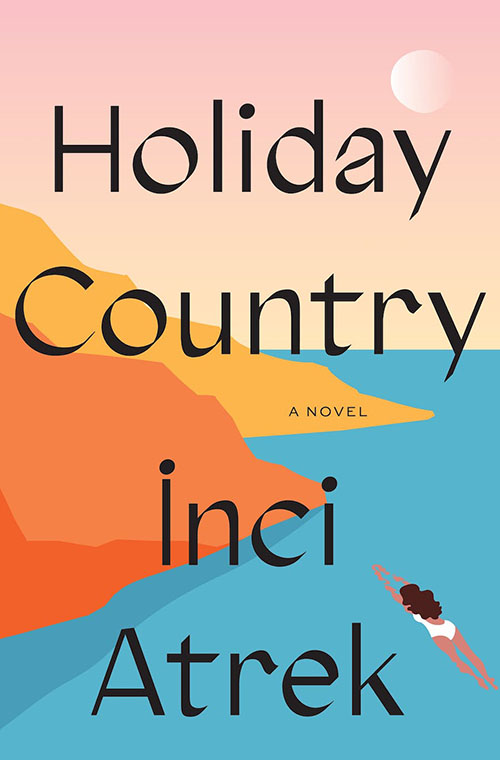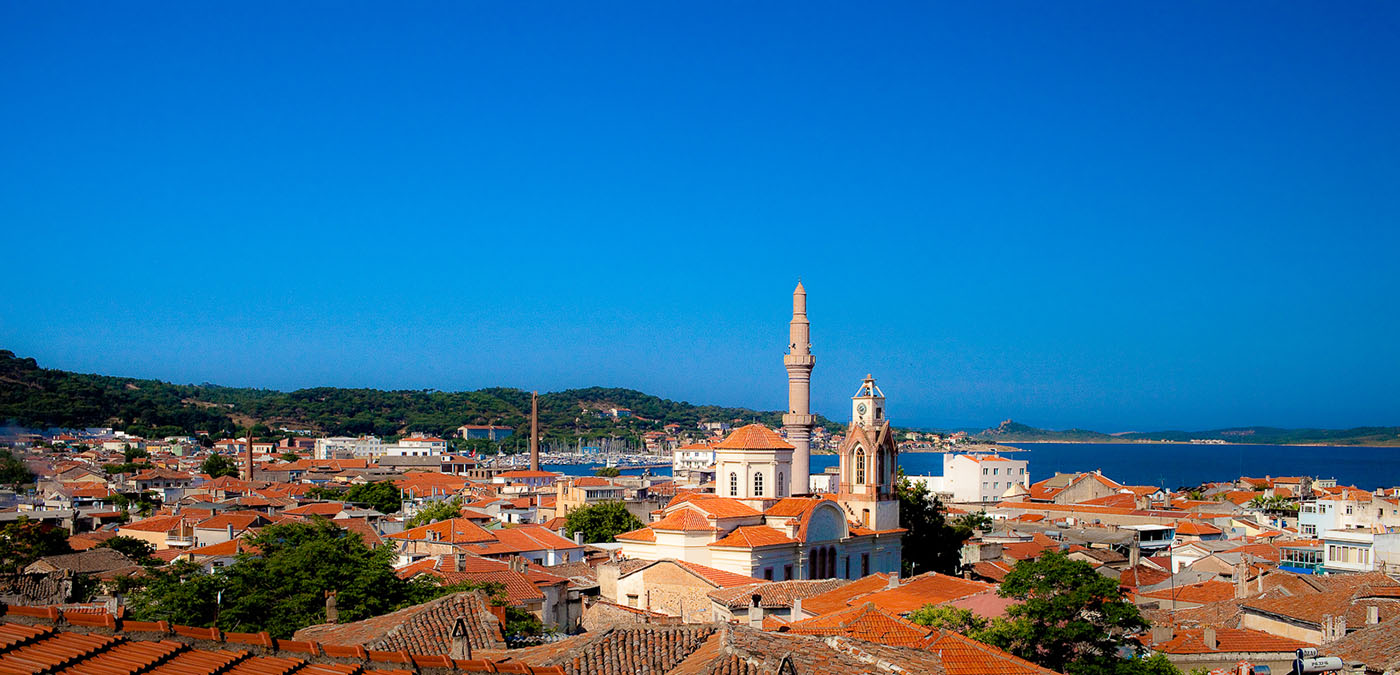For the children of immigrants, it is not always assured that one will find one’s experience reflected in literature.
Holiday Country, a novel by İnci Atrek
MacMillan 2024
ISBN 9781250332080
Amy Omar
As the daughter of Turkish parents living in an isolated Midwestern suburb, I was no stranger to the sort of projections prevalent amongst immigrant parents. Most conversations revolved around regret — Why did I move to America? Why did I marry your father? Why do the tomatoes taste like grass?
As I matured into adulthood, I began to question the idea of kismet, or fate. Armed with this pessimistic worldview of how my life could turn out, I found myself tip-toeing around potential land mines. Any small decision could drop me into a life like my parents’ — one of perpetual what ifs. But then, what if I could go back in time and redeem the “mistakes” of my parents? Was I expected to believe that we are merely nonautonomous puppets of destiny or are we actually the drivers of our own fate?
I didn’t grow up reading Turkish novels, particularly those by female authors. For many years, my Turkish literary knowledge ended at Orhan Pamuk. Then in 2019, I came across The Four Humors, a debut novel by a Turkish-American author, Mina Seçkin. For the first time in my literary history, I felt seen in a novel. A fellow Turkish-American? Spending summers in Turkey? Finding out family secrets? How did she know my story?

Seçkin opened a new world for me of female Turkish authors. Each unique in their own right, I nevertheless felt our common blood flowing throughout. I voraciously read Elif Batuman, Elif Shafak, Ayşegül Savaş and Nazlı Koca. I even had the chance to meet and interview some of these authors, bonding over our shared cultural and linguistic experiences. Many of these writers also chose to write in English, sprinkling bits of Turkish throughout for emphasis.
My latest discovery in this vein is İnci Atrek’s debut English language novel, Holiday Country, which explores the role of fate within the context of personal cultural identity and the lengths a person might go to take back a culture that feels questionably hers to begin with.
Like myself, Atrek is a Turkish-American who was raised in California, with summers spent in Turkey. We both grew up living a bifurcated existence — between two worlds, two languages and onion layers of opposing cultural expectations.
I immediately connected with Holiday Country’s protagonist, Ada, a bold, frequently fearless and impassioned 19-year-old, the daughter of a Turkish immigrant mother and an American father. Raised in California, she has spent nearly every summer of her youth with her mother Meltem at her grandmother’s house in Ayvalık, Turkey, a sleepy resort town off of the Aegean Sea. Ada isn’t like the children of other immigrant parents living in America; she doesn’t try to assimilate into Americanisms or hide her roots. Instead, she takes any opportunity to connect to her culture, eventually taking her reverse assimilation into Turkey to extreme lengths.
Irrespective of her precocious exterior, on the inside Ada is full of cultural insecurities. She kicks herself for her inability to speak as fluently as the locals or easily pick up the pop culture and political references thrown around. No matter how much she tries, her “personality gets lost in the shuffle”…she is “not [herself] when [she] speaks Turkish.” Like Selin, the protagonist of Batuman’s The Idiot and Either/Or, Ada remains the linguistic outsider, inevitably missing the mark. Can Turkey ever be more to her than just a “holiday country”?
On the surface, this summer should be like any other — Ada has three months ahead of her in Ayvalık, where the sea bream flows and time passes with childhood friends Aslı, Ozan and Bulut. They revert back into their Ayvalık personas, seemingly stuck in time, performing the same yearly antics. One wonders what this friendship would look like outside of their summers. How much of our true selves are exposed when we are on holiday, detached from reality?
The simplicity of previous summers quickly fades away when a mysterious man from her mother Meltem’s past shows up on the island. Middle aged and attractive, Levent wears a “shark tooth on a leather string” around his neck, an “interesting choice of accessory — a child’s accessory — for someone [Ada’s] father’s age.” Why is he here and what does he want?
Ada is thirsty for information. Especially when it comes to who her mother was before moving to America, before “gradually declining into a different person.” Ada places Meltem under the harsh microscope that daughters often do. Mothers are initially the guides to womanhood, but as we come of age and begin to formulate our own identities, their mask is lifted, exposing their cracks, flaws, and insecurities.
Ada romanticizes stories of Meltem’s life before her own birth, when her “mother used to be someone who looked after herself. Cold creams with flakes of gold, an array of pots and potions lining the double vanity of the bathroom.”According to Ada, Meltem sacrificed it all to marry her father and move to America — a place where her American husband recently confessed to his infidelity. Ada uses her father’s indiscretion as the motive for her plan. “My mother’s adjustment to America was a sacrifice that deserved more than what he had given her. I will not forgive him for it.”
Now enter Levent — the presumed cure to everyone’s problems. Meltem can now reunite with the Turkish man she was destined to marry and she’ll move back to Istanbul. Her grandmother will be relieved of her loneliness and Ada will become finally whole — a Turkish child with Turkish parents. Meltem’s predetermined fate will successfully be restored.
The funny thing about toying with fate is that it requires the actors to play along with the plan. Unbeknownst to Ada, neither party is interested in playing along to Ada’s fantasy. In a perverse turn of events, Ada decides to insert herself into the shoes of her mother. If Ada can form a life with Levent, maybe she can go back in time and metaphorically amend Meltem’s mistakes of the past? Perhaps she can prevent herself from falling into the traps that her mother fell into?
Almost bewitched, Ada continues to pursue Levent. In her perspective, he’s playing along with her game, feeding her just enough to keep her returning to spy on him from the mulberry trees aside his house:
“I realize this is strange,” he admits, and pauses. “I’d like to spend some more time with you, but there are very few places in this town where we can be alone. I never really understood why people had kids until I met you.”
“You’re so much like her. Bolder though. More decisive…It’s like I’m seventeen again, seeing you there in front of me.”
Is Levent trying to pursue Ada too or is he merely a perpetual bachelor type who enjoys the ego stroke her attention offers?
If Meltem won’t take control of her life, Ada will do everything in her power to maintain her own autonomy. This is apparent not only in her decision to pursue Levent, but also the relationship she left behind in California. Her boyfriend, Ian feels like an afterthought. Ada is so affected by her parent’s relationship that she projects their dynamic onto her own. If she lets Ian into her Turkish world, not only would he not understand her identity, she runs the risk of misrepresenting her fluency. In America Ada is Turkish, but in Turkey she is the American.
Ada’s vision is skewed by youthful ignorance. She spins a web of lies, justifying them as part of her search for what might make her feel whole. And as her web unravels, she questions the possibility that maybe the people around her are more in control of their destinies than is obvious at first glance.
That false idea that a daughter might have about her mother’s past is one that felt very familiar to me. On a recent trip with my mother to visit my grandmother in Istanbul, I found myself latching onto every melancholic expression as a justification of why my mother should pack up her life in Ohio and move back to her home. Yet, as the summer drew to an end, the jokes with old friends faded, her tolerance for her mother’s eccentricities waned, and as we sat in the airport together awaiting our flights, she turned to me and said, “You know, I’m ready to go home.” While we, as children, will never really know who our parents were before they were our parents, occasional glimmers of character or sound bites of information can lead us to believe that there is more to their stories than meets the eye.
In the end, Ada’s desired fate became Atrek’s own. Though she began life in America and has called many places around the world home, in 2019 she ended up right back where it all started — Istanbul, Turkey, where she has resided since.




